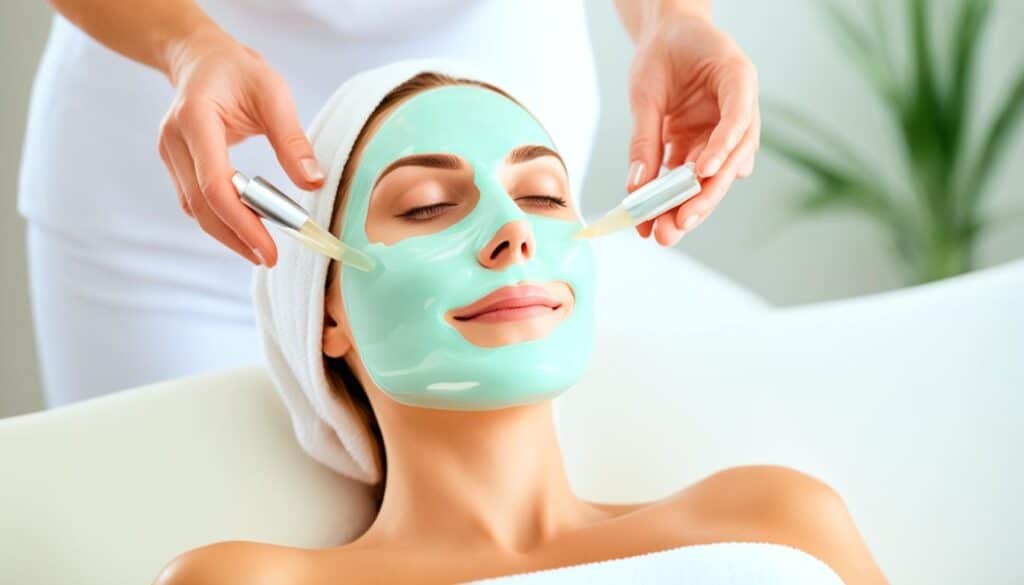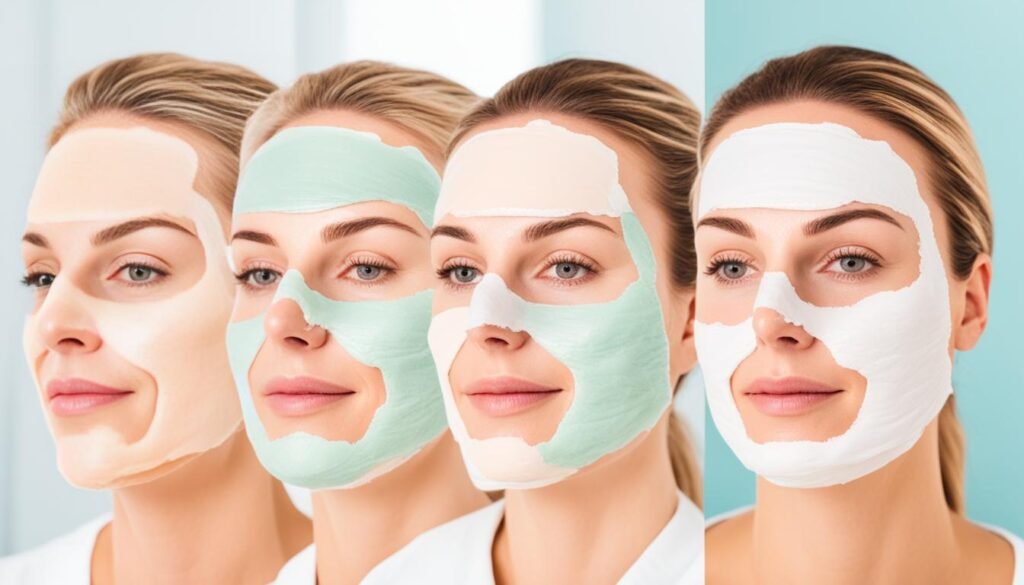Face masks are now a key part of many skin care routines. They offer many benefits for the skin. These products can make dry skin feel hydrated and soft again.
They also help clear out pores and remove dirt. This makes the skin look smoother and more even. Face masks can lessen the look of fine lines and wrinkles too.
They can also make the skin look brighter and more even in color. Plus, they can control how much oil the skin produces. This makes them good for all kinds of skin.
Adding face mask skin care to your routine can make your skin look glowing and healthy.
Key Takeaways
- Face masks can hydrate and moisturize dry, dehydrated skin, improving its elasticity and softness.
- They can unclog pores and remove impurities, enhancing skin texture and tone.
- Face masks can reduce the appearance of fine lines and wrinkles, while brightening and evening out the skin’s complexion.
- They can help control excess oil and sebum production, making them suitable for various skin types.
- Incorporating face mask skin care into your routine can lead to radiant, healthy-looking skin.
Introduction to Face Mask Skin Care
Face mask skin care uses special masks to fix different skin issues. These masks are put on clean skin and left for a bit before washing off. This lets the ingredients deeply nourish the skin.
Face masks can do many things like make dry skin moist, clear pores, control oil, improve texture, and lessen fine lines and wrinkles.
Definition of Face Mask Skin Care
Face mask skin care is a way to take good care of your skin. It means using masks often to meet your skin’s needs. These masks have ingredients that clean, feed, and refresh your skin, giving your skin an extra boost.
Importance of Face Mask Skin Care
Adding face mask skin care to your routine is key for many reasons. Masks give your skin extra nourishment and treatment that regular products might not. They deeply clean, tackle specific issues, and make your skin look fresh and bright.
Using masks often helps keep your skin healthy and balanced. It also stops skin problems from happening. Applying and removing masks can be a relaxing way to take care of yourself and feel good.
Want to know more about what is face mask skin care, the purpose of face masks, or the benefits of facial masks? Adding face mask skin care to your routine is a great move. It helps you understand the importance of face masks and their benefits. This way, you can see the why use face masks and get healthier, glowing skin.
Hydrating and Moisturizing Skin
Face masks can help make your skin hydrated and moisturized. They use ingredients like shea butter, grape seed oil, and stone crop. These hydrating face masks and moisturizing face masks keep moisture in, make skin elastic, and feel soft.
Replenishing Dry and Dehydrated Skin
Face masks tackle dryness and dehydration at their core. They use skin-quenching actives to replenish dry skin and improve skin dehydration. This brings back the skin’s natural balance and glow.
Enhancing Skin Elasticity and Softness
Face masks also make skin more elastic and soft. Ingredients like bamboo, reishi mushroom, and anti-aging actives help. They boost collagen production and target aging signs. This makes skin look plumper and smoother, giving it a youthful glow.
Unclogging Pores and Removing Impurities
Face masks are great for unclogging pores and removing impurities. They use ingredients like bentonite clay, charcoal, and kaolin clay. These ingredients pull out dirt, oil, and other stuff that gets stuck in pores.
These pore unclogging face masks and deep cleansing face masks deeply clean the skin. They make pores look smaller and help prevent pimples and breakouts. After using these masks, your skin feels fresh, clean, and looks radiant.
| Ingredient | Benefits |
|---|---|
| Bentonite Clay | Absorbs excess oil and unclogs pores |
| Charcoal | Deeply cleanses and detoxifies the skin |
| Kaolin Clay | Draws out impurities and refines pores |
“Face masks formulated with purifying ingredients can leave your skin feeling refreshed, clean, and radiant.”
Adding pore unclogging face masks and deep cleansing face masks to your skincare routine helps remove impurities. This keeps your skin healthy and looking good.
Improving Skin Texture and Tone

Face mask skin care is great for making the skin look better. Ingredients like vitamin C, retinol, and fruit enzymes help smooth out fine lines and wrinkles. They also make the skin brighter and more even. These radiant skin face masks can make the skin look younger, brighter, and healthier.
Reducing the Appearance of Fine Lines and Wrinkles
Using anti-aging face masks often can lessen the look of fine lines and wrinkles. These masks have ingredients that help skin cells turn over faster, increase collagen, and make the skin plumper. This makes the skin look smoother and younger. Reducing fine lines and wrinkles can make you look refreshed and rejuvenated.
Brightening and Evening Out Skin Tone
Face masks can also make the skin brighter and more even. Ingredients like vitamin C, licorice root, and raspberry extract help reduce discoloration and dark spots. With these masks, your skin can look more radiant and evenly toned.
“Improving skin texture and tone can have a transformative effect on one’s appearance, boosting confidence and overall well-being.”
Controlling Excess Oil and Sebum Production

For those with oily or combination skin, using face masks can change the game. Masks with ingredients like clay and charcoal absorb oil. They help reduce shine and make pores look smaller.
These oil control face masks, mattifying face masks, and sebum regulating face masks balance the skin’s oil. They absorb too much sebum, tighten pores, and stop impurities from causing blemishes.
“Using the right face mask can be a game-changer for those with oily skin. It helps control shine, minimize the appearance of pores, and leave the skin feeling refreshed and balanced.”
Adding these masks to your skincare routine can help manage your skin’s oil. It leads to a smoother, refined look that stays matte all day. By tackling the cause of too much sebum, your skin gets a radiant, even look.
Face Mask Skin Care for Different Skin Types
Face masks come in many types, each suited for different skin needs. It’s important to pick the right one for your skin type. Let’s look at the best face masks for various skin types.
Face Masks for Dry Skin
If you have dry skin, face masks with hydrating and moisturizing ingredients can help. Look for masks with shea butter, grape seed oil, and honey. These ingredients moisturize and strengthen your skin. Hydrating face masks for dry skin make your skin feel soft, smooth, and supple.
Face Masks for Oily Skin
Oily skin types benefit from face masks that control oil and unclog pores. Masks with clay, charcoal, and ingredients like raspberry and blackberry absorb oil and shrink pores. They leave your skin looking matte and refined. Mattifying face masks for oily skin and pore refining face masks for oily skin are key for a healthy look.
Face Masks for Combination Skin
Combination skin needs masks that balance moisture and oil control. Masks with both moisturizing and mattifying ingredients can help. They address the T-zone and cheek areas, making your skin look even and balanced. Balancing face masks for combination skin and hydrating and mattifying face masks for combination skin are great for this skin type.
Face Masks for Sensitive Skin
Choose face masks that are gentle and non-irritating if you have sensitive skin. Masks with soothing ingredients like chamomile, calendula, and arnica calm redness and inflammation. They also hydrate and nourish your skin. Soothing face masks for sensitive skin and calming face masks for sensitive skin improve your skin’s comfort and look.
Face Mask Skin Care Based on Age

As we get older, our skin changes, and so should our face mask routine. From the young glow of our 20s and 30s to the mature look of our 40s, 50s, and beyond, the right face masks can really help. They address skin concerns and keep our skin healthy and glowing.
Face Masks for Younger Skin
In our younger years, we need face masks that keep skin hydrated, bright, and smooth. Ingredients like strawberry, rhubarb, and citrus are great for this. They tackle dryness, uneven skin, and breakouts, making our skin look radiant and healthy.
For those in their 20s and 30s, face masks for younger skin are a must. They deeply hydrate, balance oil, and make skin look young and glowing.
Face Masks for Mature Skin
When skin ages, we need face masks that fight aging signs. Ingredients like bamboo, reishi mushroom, and avocado oil help with fine lines, wrinkles, and losing elasticity. These masks replenish moisture, boost collagen, and make skin look younger.
For those in their 40s, 50s, and 60s, face masks for mature skin are key. They help with aging skin issues, making a big difference in their skincare routine.
| Skin Type | Recommended Face Masks | Key Benefits |
|---|---|---|
| Younger Skin (20s-30s) | Strawberry, Rhubarb, Citrus | Hydration, Brightening, Pore Refinement |
| Mature Skin (40s-60s) | Bamboo, Reishi Mushroom, Avocado Oil | Anti-Aging, Moisture Replenishment, Collagen Boosting |
Types of Face Masks
Face masks can change your skin care game. They come in many textures and types, each tackling different skin issues. From cream face masks that moisturize to gel face masks that control oil, there’s a lot to choose from.
Cream Face Masks
Cream face masks are known for their moisturizing power. They’re full of ingredients like shea butter, grape seed oil, and honey. These masks make dry skin feel soft, supple, and glowing.
Gel Face Masks
If you have oily skin, gel face masks are a great choice. They’re light and water-based, perfect for balancing your skin. Ingredients like raspberries, blackberries, and stone crop help control oil and refine pores.
Clay Face Masks
Clay face masks use bentonite, kaolin, and charcoal to deeply clean your skin. They remove dirt, absorb oil, and make your skin look refreshed and refined.
There’s a face mask for every skin type and concern. Try different textures and see what works best for you. Find the perfect mask for a new skin care experience.
How to Apply a Face Mask

Getting the most out of a face mask starts with a clean face. Clean your skin well before applying the mask. Use damp hands to spread the mask from chin to forehead, skipping the eyes.
Leave the mask on for 10-20 minutes for best results. This lets the ingredients deeply nourish your skin. After, rinse it off with warm water without scrubbing hard.
If the mask won’t come off easily, try a warm, wet washcloth on your face. Let it sit for a few minutes to soften the mask. Then, rinse and pat your skin dry, and continue with your skincare routine.
- Cleanse your face thoroughly to prepare a clean canvas.
- Use damp hands to evenly apply the mask from chin to forehead, avoiding the eye area.
- Leave the mask on for the recommended duration, typically 10-20 minutes.
- Rinse the mask off gently with warm water, or use a warm, wet washcloth to help dissolve it.
- Pat your skin dry and follow up with your regular skincare routine.
Follow these steps for how to apply face masks, face mask application tips, and proper face mask usage. This way, you get the most out of your mask.
“Applying a face mask correctly is the key to unlocking its full benefits.”
Frequency and Consistency of Face Mask Usage

Using face masks regularly is key to getting the most out of them. It’s best to use them once or twice a week. This lets your skin get the benefits without overdoing it.
Being consistent helps your skin look better over time. Using face masks often can make your skin look and feel amazing. By making them a regular part of your skincare, you’ll see big changes in your skin’s health and look.
- How often to use face masks: Once or twice a week for the best results.
- When to use face masks: Add them to your routine 1-2 times a week.
- Face mask usage consistency: Stick with a regular face mask routine for lasting skin benefits.
“Consistent use of face masks can lead to remarkable improvements in skin health and appearance.”
Stick to the recommended use and be consistent with your face masks. This will help you get the glowing, healthy skin you want. Remember, being patient and dedicated is important with any new skincare plan. But, the results will be amazing.
Face Mask Skin Care

Adding face mask skin care to your routine is a smart move. Incorporating face masks helps with many skin issues, like hydration, oil control, anti-aging, and brightening. These masks pack a punch with active ingredients that feed, refresh, and boost your skin’s health and look.
Regular use of face mask skin care can make your skin look better. It can give you a radiant glow. If you want a glowing face mask skin care routine or need to fix a skin problem, face masks are a great choice.
Benefits of Face Mask Skin Care
- Deeply hydrates and moisturizes the skin
- Unclogs pores and removes impurities
- Improves skin texture and tone
- Reduces the appearance of fine lines and wrinkles
- Brightens and evens out skin tone
- Controls excess oil and sebum production
| Skin Concern | Recommended Face Mask |
|---|---|
| Dry, dehydrated skin | Hydrating cream or gel mask |
| Oily, acne-prone skin | Clay-based mask |
| Dull, uneven skin tone | Brightening mask with vitamin C or niacinamide |
| Mature, aging skin | Retinol or collagen-infused mask |
By incorporating face masks into your skin care routine, you can enjoy the benefits of face mask skin care. Try out different masks to see what suits your skin best.
Conclusion
Using face masks in your skin care routine brings many benefits. They help hydrate and moisturize your skin. They also clear pores and make your skin’s texture and tone better.
No matter your skin type, like dry, oily, combination, or sensitive, there’s a mask for you. These masks meet your specific needs and help you reach your skin care goals. Adding face masks to your daily routine can change how your skin looks and feels.
Face masks are key to good skin care. They help your skin reach its best potential. By using them regularly, you can see lasting improvements in your skin’s health and appearance.
FAQs
Q: What are the benefits of using a facial mask for skin care?
A: Facial masks provide various benefits such as deep cleansing, hydration, reducing acne, anti-aging properties, and promoting radiant skin.
Q: How often should I use a skin care mask?
A: It is recommended to use a skin care mask 1-2 times a week, depending on your skin type and the specific mask you are using.
Q: What is the difference between a sheet mask and a clay mask?
A: Sheet masks are hydrating and easy to apply, while clay masks are more detoxifying and draw out impurities from the skin.
Q: Are there masks available for all skin types?
A: Yes, there are masks specifically designed for all skin types, including sensitive, oily, dry, and combination skin.
Q: Do sheet masks contain parabens?
A: Many sheet masks are paraben-free, but it is always best to check the ingredient list to be sure.
Q: How can a vitamin C clay mask benefit the skin?
A: Vitamin C clay masks help brighten the skin, even out skin tone, and provide antioxidant protection against environmental damage.
Q: Can I use an overnight mask every night?
A: Overnight masks are typically designed to be used 2-3 times a week for best results, as they are more intensive treatments for the skin.




